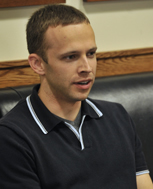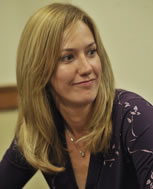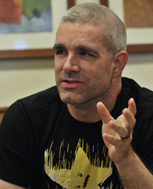With the last of U.S. troops exiting Iraq after nearly nine years, many veterans will be coming home and taking on new challenges—some, perhaps, in public policy. Earlier this semester, State & Hill spoke with a group of veterans in the MPP and MPA programs about the lessons they've brought from their military service to the Ford School. An edited version of this conversation is available in the Winter 2011 issue.
John Stanczak, who is still active in the U.S. Army, served in Iraq for 15 months. He will be serving with the 1st Armored Division at Ft. Bliss in El Paso, Texas, following graduation.
Ingrid Schuster Tighe is a former Army communications officer with leadership experience during wartime in Baghdad, Iraq, and peace-keeping missions in Macedonia and Kosovo. After her military service, Ingrid worked in commercial real estate and founded her own leadership consulting business.
2011 Bromage Intern George Stankow spent 13 years in uniform as an active and reserve U.S. Army officer, including tours in Korea, Germany, Kosovo, Egypt, and Iraq. He also spent two years in Iraq as a civilian contractor.
Brian Runion graduated from the United States Coast Guard Academy in 2006. He served five years as a Coast Guard officer, working throughout the Americas in a number of capacities, including law enforcement, public affairs, and logistics.
 |
|
John Stanczak |
S&H: Let's start with how your military service influenced your decision to come to the Ford School. I know George told an interesting story at orientation after your experience in Iraq.
George: I went to Iraq first as a contractor and then as an activated reservist. Another reservist was actually a bee keeper in civilian life and he came up with this idea, why don't we see if we can get beehives and specifically to war widows as an agricultural/economic project. I thought it was a great idea. We put together this great presentation, we talked to some US Department of Agriculture guys, talked to some State Department guys, had it all figured out, and we presented it to the generals who controlled our money stream for these kind of projects. They hated it. They absolutely hated it. They could not figure out why this was useful at all and I'm sitting there and I realize, "That guy's an infantry general, that guy's an artillery general, that guy's another artillery guy. What do these guys know about agriculture and small business? But they were the ones making the decision because that's how things were in Iraq, and so I said to myself, "There's got to be a better way to do this." And when I came back to the U.S. and I started looking around at schools because I had made up my mind I was going to use my GI Bill benefits. I found the Ford School and thought this is maybe how I can figure out what a better way is. Maybe the next time get sent to some foreign land to try to rebuild their economy, I'll be able to use this.
Ingrid: One of my jobs in Iraq was to set up our commanding general's daily video teleconferences with various leaders. It was really interesting because I got to sit in the corner and listen. I remember one conversation with Assistant Secretary of Defense Paul Wolfowitz and they were talking about policy issues that were affecting troops and I remember thinking, "Wow, I think I could be really involved with affecting troops in a civilian role, too." But at the time I felt like I didn't know much about how public policy and foreign policy were developed, so that helped make my decision to come here.
 |
|
Ingrid Schuster Tighe |
John: Like a lot of students who are still active duty, I'm hoping to use my MPP to get into the military's Strategy and Policy Program, which is what Scott Thompson (MPP '11) is doing to become a campaign planner. To sum it up, campaign design and planning consists of developing a campaign focus, flexible options, and strategies. So you're going to be looking at numbers, looking at the total budget, and saying "Is it feasible to move so many supplies and troops in a particular direction?" You can use your degree in a lot of ways as a campaign planner.
S&H: I would imagine your perspective on international affairs could be very different from what you'd hear in a classroom. How much frustration, or maybe it's just the need to speak up, do you feel?
Brian: Coming from the Coast Guard, I think my perspective on how the world works is a little bit different, because I see everything as sort of a maritime issue. I think I find myself making these connections back to how it impacts maritime events and everything. One of the things I need to do while I'm here is get used to looking at everything as more interconnected and less what's happening along the coast or what's happening in waterways. It's kind of a balance for me. I love to contribute; I love to be able to stay involved. But at the same time I don't want to be talking over other people. We're sitting in classes with a lot of very knowledgeable people, so in one sense I don't want to speak up and say too much. I don't want to be dominating the conversation.
S&H: Out in Public hosted a forum on the end of Don't Ask, Don't Tell about a week before the policy was changed. It was a very informative and insightful discussion led by students who had served, including you, George. Do you think there are other opportunities for those kinds of discussions?
George: I think there could be. It was a good topic to pick because it was at the time an issue that was very much in the public consciousness. It was being argued but it wasn't clear which way it was going to go. And it was really interesting. I won't say I'm surprised at how well it went in the sense that nobody disrupted it. I think even the guys on the panel were just kind of, "Hey, it's going to happen," so that helped. I really enjoyed it. It was nice to apply my perspective that directly. It's a little harder to do that in an economics course, or an elections and campaigns case.
 |
|
George Stankow |
S&H: What is the support system like for Ford School veterans?
Ingrid: I remember meeting Brian and saying, "Oh, you're Coast Guard." I think instantly we had that connection because we both had the GI Bill to talk about. I think (military service) definitely gives you the ability to connect with someone, build friendships, because you understand where each person is coming from.
George: Michigan is an incredibly vet-friendly school. I have friends who are doing their GI Bill in other places, and most of them have had administrative issues of some kind with billing or the timing of payments; I never have. If I get an email from the registrar's office, I'll go over there and before I could finish a sentence they'd say, "You're GI Bill? Don't worry about it. Done."
John: I remember talking to Scott Berkley when I was in Iraq and saying, "I don't think I'm going to make it this time around, I need an extension." And he was really helpful, and actually able to push that out for another year to graduate in 2012. So that was really nice to get accepted and have that one-year waiver.
Other schools, from friends that I've talked to, they weren't like that. They weren't able to bend on the waiver. Michigan's one of the few schools to take your situation seriously and be willing to work with you. So that's really appreciated.
Brian: I have found this to be an incredibly welcoming place since the moment I showed up. I remember when I was looking at (the Ford) school, I visited one of the classes and the girl next to me leaned over and said, "Oh, it's great having people from the military in class, they offer such a different perspective than you usually get." From the moment I came here, it was clear I had to come here and this was the best place for me as a former military officer.
On top of that I have a bit of a support network here with Coast Guard people, which makes it fairly easy to have a tailgate before football games. You'll see the big balloon with the Coast Guard flag on it –
 |
|
Brian Runion |
Ingrid: – we won't shoot it down. [laughter]
George: Does it freak you out being this far away from water? [laughter]
Brian: It does, it was actually something I thought of…even though there's a fairly sizable Coast Guard presence in Michigan, yeah, not knowing where the ocean is frightening to me. [laughs]
S&H: Does viewing policy issues from an academic standpoint add anything to your training and experience?
John: One thing the military is really pushing for is having a broad sense of who you are. General Casey (Army Chief of Staff until April 2011) was saying he wanted officers to leave the military and take private sector jobs before coming back because he wants his officers to have a cultural understanding and a business understanding.
George: There's an existential debate in the Army about whether we spend too much time on base, and whether we have a good understanding of what's going on in the world around us. That happens when there's a drawdown looming, and we suddenly realize that not everyone is as concerned with the next battle as we are. So I think the Ford School is a good place to get that perspective. It's good to get an idea of what the world looks like from the outside.
S&H: George, you have experience in Iraq as a contractor and a soldier, but I know you didn't seek out defense related internships for the summer. Why?
George: There were a lot of internships that I decided not to go for, especially anything in DC, because I didn't want to get pigeonholed as "the military guy." I'm geographically locked for family reasons in southeast Michigan, and there are not that many military policy type jobs that I could have here. I wanted to spread my wings a little and get an experience outside of that for my internship.
S&H: Brian, how does that resonate with you? What are you looking for, because I know you'll be looking to do your internship…what did you kind of have in mind, knowing that Coast Guard's still going to be in the plans in some way, or serving in some way?
Brian: I agree with what George just said, which is trying to go beyond and get outside of that pigeonhole of being a military officer. Part of the reason that I wanted to come and take this sabbatical opportunity, to go to graduate school, was to get myself outside the Coast Guard mindset for a while and see a little bit of what's outside. For my internship, I'd like to look for something that has to do with education. I have a pretty strong background in national security, but I'd like to get experience in an area that's outside anything I've done. I want to have something else that I can go to.
S&H: Brian, I remember a conversation we had when you said this is the first time you've been in a civilian college setting, right?
Ingrid: He's embraced it, look at the sideburns! [laughter]
Brian: Yeah, this is the first time since high school I've been able to grow my hair out, so that's a little different. But actually, the similarities have surprised me more than the differences and I think that's why I wanted to come here. The Coast Guard Academy is a very small school, a thousand cadets, and even though there is a military structure, the faculty is very approachable. And the Ford School is the same way: small classes, approachable faculty.
George: And have a football team.
Brian: [laughs] We have a good football team. But it's definitely been a change of pace, and there are a lot of things I've been getting used to as far as differences in the way things are done. We were always required to show up to every single one of our classes, and the idea of not going to a class or being late to a class was absolute heresy at the Academy. But here, a lot of people just don't show up.
S&H: Are you trying to say that you don't go to class Brian?
Brian: No, I do go to class! It's definitely been a different experience, but I think really there are a lot of similarities and it seems like this school keeps all the same positive things that I liked about the Coast Guard Academy, which, granted, was a small list. But yeah, I think it's great.
S&H: Did any of you also go through an Academy? ROTC?
Ingrid: ROTC. We had fun in undergrad. [laughter]
Below is an edited, formatted version of this article from State & Hill, the magazine of the Ford School. View the entire Winter 2012 State & Hill here.